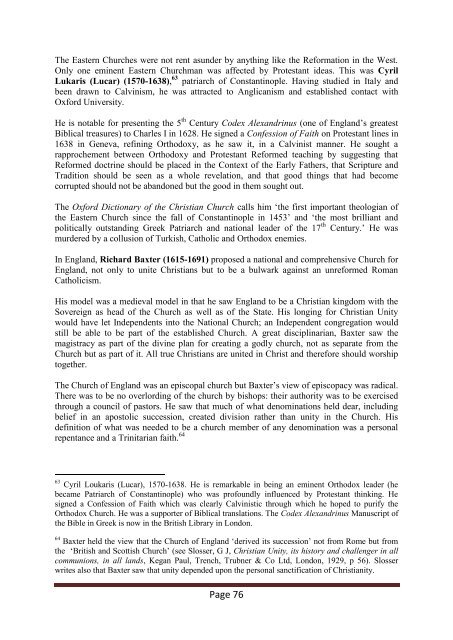Digging Out the Embedded Church - The Maranatha Community
Digging Out the Embedded Church - The Maranatha Community
Digging Out the Embedded Church - The Maranatha Community
You also want an ePaper? Increase the reach of your titles
YUMPU automatically turns print PDFs into web optimized ePapers that Google loves.
<strong>The</strong> Eastern <strong>Church</strong>es were not rent asunder by anything like <strong>the</strong> Reformation in <strong>the</strong> West.<br />
Only one eminent Eastern <strong>Church</strong>man was affected by Protestant ideas. This was Cyril<br />
Lukaris (Lucar) (1570-1638), 63 patriarch of Constantinople. Having studied in Italy and<br />
been drawn to Calvinism, he was attracted to Anglicanism and established contact with<br />
Oxford University.<br />
He is notable for presenting <strong>the</strong> 5 th Century Codex Alexandrinus (one of England‟s greatest<br />
Biblical treasures) to Charles I in 1628. He signed a Confession of Faith on Protestant lines in<br />
1638 in Geneva, refining Orthodoxy, as he saw it, in a Calvinist manner. He sought a<br />
rapprochement between Orthodoxy and Protestant Reformed teaching by suggesting that<br />
Reformed doctrine should be placed in <strong>the</strong> Context of <strong>the</strong> Early Fa<strong>the</strong>rs, that Scripture and<br />
Tradition should be seen as a whole revelation, and that good things that had become<br />
corrupted should not be abandoned but <strong>the</strong> good in <strong>the</strong>m sought out.<br />
<strong>The</strong> Oxford Dictionary of <strong>the</strong> Christian <strong>Church</strong> calls him „<strong>the</strong> first important <strong>the</strong>ologian of<br />
<strong>the</strong> Eastern <strong>Church</strong> since <strong>the</strong> fall of Constantinople in 1453‟ and „<strong>the</strong> most brilliant and<br />
politically outstanding Greek Patriarch and national leader of <strong>the</strong> 17 th Century.‟ He was<br />
murdered by a collusion of Turkish, Catholic and Orthodox enemies.<br />
In England, Richard Baxter (1615-1691) proposed a national and comprehensive <strong>Church</strong> for<br />
England, not only to unite Christians but to be a bulwark against an unreformed Roman<br />
Catholicism.<br />
His model was a medieval model in that he saw England to be a Christian kingdom with <strong>the</strong><br />
Sovereign as head of <strong>the</strong> <strong>Church</strong> as well as of <strong>the</strong> State. His longing for Christian Unity<br />
would have let Independents into <strong>the</strong> National <strong>Church</strong>; an Independent congregation would<br />
still be able to be part of <strong>the</strong> established <strong>Church</strong>. A great disciplinarian, Baxter saw <strong>the</strong><br />
magistracy as part of <strong>the</strong> divine plan for creating a godly church, not as separate from <strong>the</strong><br />
<strong>Church</strong> but as part of it. All true Christians are united in Christ and <strong>the</strong>refore should worship<br />
toge<strong>the</strong>r.<br />
<strong>The</strong> <strong>Church</strong> of England was an episcopal church but Baxter‟s view of episcopacy was radical.<br />
<strong>The</strong>re was to be no overlording of <strong>the</strong> church by bishops: <strong>the</strong>ir authority was to be exercised<br />
through a council of pastors. He saw that much of what denominations held dear, including<br />
belief in an apostolic succession, created division ra<strong>the</strong>r than unity in <strong>the</strong> <strong>Church</strong>. His<br />
definition of what was needed to be a church member of any denomination was a personal<br />
repentance and a Trinitarian faith. 64<br />
63 Cyril Loukaris (Lucar), 1570-1638. He is remarkable in being an eminent Orthodox leader (he<br />
became Patriarch of Constantinople) who was profoundly influenced by Protestant thinking. He<br />
signed a Confession of Faith which was clearly Calvinistic through which he hoped to purify <strong>the</strong><br />
Orthodox <strong>Church</strong>. He was a supporter of Biblical translations. <strong>The</strong> Codex Alexandrinus Manuscript of<br />
<strong>the</strong> Bible in Greek is now in <strong>the</strong> British Library in London.<br />
64 Baxter held <strong>the</strong> view that <strong>the</strong> <strong>Church</strong> of England „derived its succession‟ not from Rome but from<br />
<strong>the</strong> „British and Scottish <strong>Church</strong>‟ (see Slosser, G J, Christian Unity, its history and challenger in all<br />
communions, in all lands, Kegan Paul, Trench, Trubner & Co Ltd, London, 1929, p 56). Slosser<br />
writes also that Baxter saw that unity depended upon <strong>the</strong> personal sanctification of Christianity.<br />
Page 76








